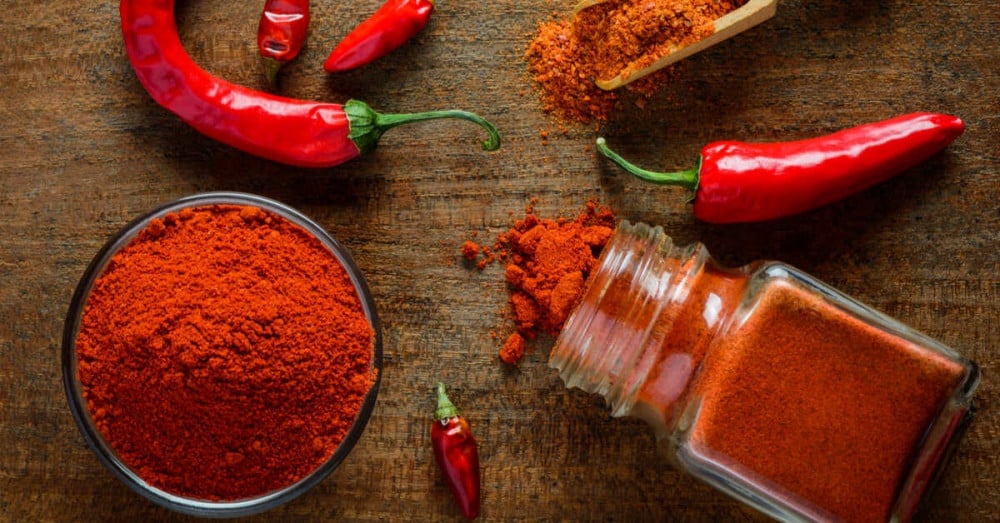
Benefits of paprika in food
Paprika is a popular spice widely used in various cuisines around the world. It is known for its many colors and distinctive flavor, which adds a distinctive flavor and beautiful color to foods. Paprika is derived from the fruits of sweet peppers or hot peppers and is roasted and then ground to turn into the paprika powder that we use in cooking. Paprika is very famous thanks to its many health and nutritional benefits. In this article, we will discuss some of the benefits of paprika in food and how to use it correctly in food preparations.
- A rich source of vitamins and minerals: Paprika is a rich source of vitamins and minerals necessary for a healthy body. It contains vitamins such as vitamin C, vitamin A, vitamin B6, folate, and niacin, which work together to support the immune system, promote healthy skin, proper cell growth, improve digestion, and support cardiovascular health.
- Improving skin health: Paprika contains a large amount of vitamin C, which is a powerful antioxidant that protects the skin from damage caused by free radicals and promotes collagen formation, which maintains skin elasticity and helps reduce the appearance of wrinkles and fine lines. In addition, paprika contains vitamin A, which improves the oiliness of the skin and reduces clogged pores and the appearance of acne.
- Supporting eye health: Paprika contains vitamin A and carotenoids, such as beta-carotene, zeaxanthin, and lutein, which promote eye health and protect them from age-related eye diseases such as cataracts, glaucoma, and macular degeneration.
- Contribution to weight management: Paprika is low in calories, low in fat, and contains fiber that makes a person feel full and helps control appetite, which helps in weight management and maintaining a healthy weight.
- Improving digestion: Paprika contains capsaicin, a compound that promotes the production of intestinal acids and digestive enzymes and enhances intestinal motility, which improves digestion and helps reduce bloating and intestinal gas.
- Promoting heart health: Paprika contains potassium, magnesium, folate, and fiber, which are components that contribute to supporting cardiovascular health. Paprika helps lower blood pressure and levels of harmful LDL cholesterol in the blood, which improves blood circulation and reduces the risk of heart disease.
- Supporting immune system health: Paprika is rich in vitamin C, which strengthens the immune system and protects the body from viral and bacterial infections and diseases. Eating paprika regularly contributes to strengthening immunity and maintaining the health of the body.
- Help reduce inflammation: Paprika contains capsaicin, which is a natural compound that has anti-inflammatory properties. Capsaicin can help reduce inflammation and relieve pain in some chronic diseases such as arthritis and rheumatoid arthritis.
- Improving respiratory health: Paprika contains capsaicin, which can help relieve congestion and congestion in the respiratory system and improve pulmonary ventilation. Paprika can be effective in relieving symptoms of colds, colds, and sore throat.
How to use paprika in food preparations:
Paprika can be used in many food preparations to add great flavor and color to dishes. Among the common uses of paprika:
- Seasoning meat and poultry: Paprika can be mixed with other spices such as salt, pepper, garlic, and onions and used to season meat and poultry before grilling or cooking.
- Preparing soups and stews: Paprika can be added to soups and stews to give them a warm and distinctive flavour.
- Pizza and pasta: Paprika can be sprinkled on pizza or pasta to add a distinctive flavor and beautiful color.
- Salads: Paprika can be added to salads to improve their taste and make them more attractive.
- Vegetarian dishes: Paprika can be used to season and prepare vegetarian dishes such as roasted potatoes, grilled vegetables, and various vegetarian dishes.
Paprika is a delicious and healthy addition to food preparations. It is distinguished by its distinctive flavor and beautiful color, in addition to its many health benefits. Using paprika in moderation in cooking contributes to improving the flavor of dishes and achieving the health benefits of this delicious spice.

